 The goal of this study was to explore the perceptions and utilization of genetic counseling and testing by people with Charcot-Marie-Tooth (CMT). It’s important to understand what people with CMT think about genetic services and what factors may be supporting or suppressing their access to these services. Participants were recruited through the Hereditary Neuropathy Foundation databases. The project was Internal Review Board (IRB) approved at the University of North Carolina at Greensboro.
The goal of this study was to explore the perceptions and utilization of genetic counseling and testing by people with Charcot-Marie-Tooth (CMT). It’s important to understand what people with CMT think about genetic services and what factors may be supporting or suppressing their access to these services. Participants were recruited through the Hereditary Neuropathy Foundation databases. The project was Internal Review Board (IRB) approved at the University of North Carolina at Greensboro.
Genetic Counseling Results
• 724 participants completed the survey. Not all participants responded to every question, and incomplete surveys were considered for the material that was provided.
• 73% of participants indicated they had never been offered an appointment with a genetic counselor.
• Of those that attended genetic counseling, 86% were happy with their experience.
• Over half of participants who have not had genetic counseling indicated they would be interested in a referral to a genetic counselor.
• 44.6% of participants who had not received genetic counseling perceived cost could be a negative of this service. Only 5.3% of those who did have genetic counseling reported cost as a negative.
Genetic Testing Results
• 53% of participants indicated that they had been offered genetic testing, 7% indicated that testing was not offered because a family member had already undergone testing, and the remainder were not offered testing.
• Of those offered, 79.6% chose to pursue testing.
• 92.5% of those that received testing were happy with their decision.
• Of those who have not had testing, 71.6% indicated they were interested in pursuing genetic testing.
• Those who had genetic testing were significantly more likely to report access to research as a benefit than those who have not had testing.
• Participants who had not had genetic testing were more likely to express concern about potential negatives from this service, including increased worry about themselves and their children post-test, increased chance of discrimination, and most of all cost.
• Only 5% of those who had genetic testing felt that the cost of testing was a negative to their experience. 62% of those who had never received testing anticipated cost would be a negative.
Comments
Many participants who had genetic counseling provided comments about their experience:
“She believed and really listened to my story and was willing to test me (with the geneticist) for the only disorder I had ever come across that matched my symptoms – CMT2C. When the results came back positive, she explained the results in detail and promised to research for more information since it is so rare. Although I am still waiting on her report 3 months later, it was still a very positive experience.”
When asked to elaborate on experience benefits of genetic testing, many participants provided comments:
“[My] Daughter [was] misdiagnosed for 7 years, [it is] nice to [now] know [her diagnosis] and be able to research and help others by being involved with research on CMT1B.”
We also received many comments from participants who are interested in testing, but have not yet had testing:
“I would like to be certain of the type and inheritance of my CMT to counsel my children.” “My kids need to know if they are carriers of the gene. They’re young adults and planning on having children of their own, but they need to know if they’ll get CMT (adult onset in our family).”
Conclusion
• Genetic counseling is an important and helpful service to patients with CMT.
• Genetic counseling can help people with CMT who are considering testing:
– Cost was an over-estimated negative by people who had not had genetic counseling or testing. Genetic counselors can research appropriate testing strategies and help people apply for insurance coverage to reduce cost.
– Participants who have not had genetic testing were also more likely to be worried about the potential for genetic discrimination and increased anxiety after testing. Talking with a genetic counseling may help alleviate some of this concern.
• Meeting with a genetic counselor after testing can help people with CMT understand their results including inheritance, natural history and progression, and research opportunities.
• Barriers to genetic counseling:
– Although genetic counseling is a great resource for people with CMT, most are not being referred to a genetic counselor.
– It is important for genetic counselors to reach out to the neurologists in their area to alert them to the services they can offer.
– Neurologists and other providers should become educated on the benefits of genetic counseling and be prepared to provide people with CMT with accurate information about benefits and potential negatives of genetic counseling and testing, and referrals to these services.
– Education of the CMT community on what options are available to them and their potential benefits and negatives will allow people with CMT to be their own advocates and request referral to genetic counseling and testing services
“As part of the Hereditary Neuropathy Foundation’s Health Care Provider (HCP) outreach program, HNF will be working to educate the genetic counselor community on the importance of identifying CMT, proper genetic testing, and providing helpful information for patient cost assistance programs.”



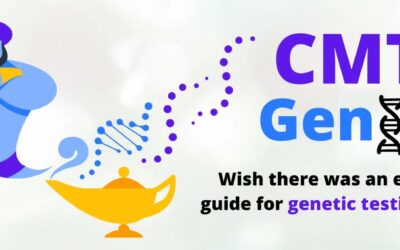
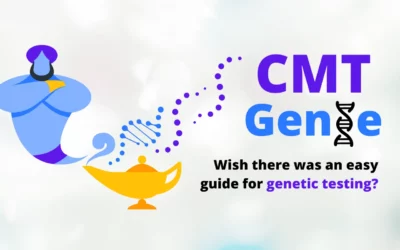
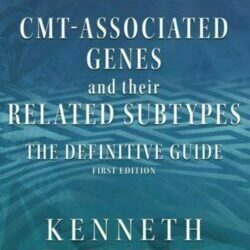
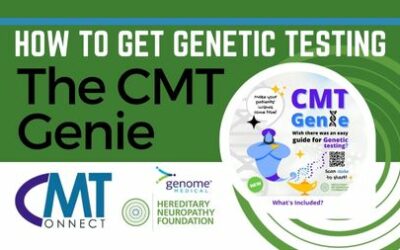

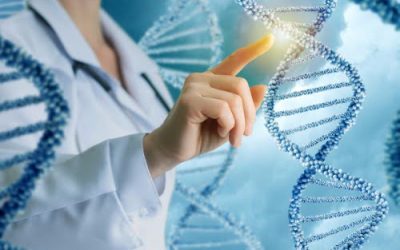
If I seek genetic testing and insurance pays, will that information be used against me, i.e. life insurance policies, denial of future health insurance eligibility, etc.?
How do I join in the research
Please join the registry your information will be utilized to move forward research and clinical trials that could lead to future treatments and cures for various forms of Charcot-Marie-Tooth (CMT) https://neuropathyreg.patientcrossroads.org/
I’m interested in knowing what type CMT that I have, but I have never been offered genetic counseling & I’m 55 years old. I feel that This would be very helpful for my children, grandchildren, many generations to come.
Margaret,
Please read this article and it will help you with your genetic resting questions. https://www.hnf-cure.org/featured/qa-stephanie-gandomi-m-s-lcgc-invitae/
I was born with scoliosis and caves feet, extremely high arch feet.
I have had Chiropractic care since the age of 15 years old, I have been in leg and feet pain over the years and now at the age of 53 it is debilitating. I have mentioned to several Dr.s and specialist about possibly having CMT and they smile and say no i do not have that or they are puzzled in not seeing any cases in many years if they seen any at all. I have a pinched nerve in S1 in my back planter factitious, tendinitis in my ankles extreme painful arches with spasms.